Quentin Lhoest
Croissant: A Metadata Format for ML-Ready Datasets
Mar 28, 2024Abstract:Data is a critical resource for Machine Learning (ML), yet working with data remains a key friction point. This paper introduces Croissant, a metadata format for datasets that simplifies how data is used by ML tools and frameworks. Croissant makes datasets more discoverable, portable and interoperable, thereby addressing significant challenges in ML data management and responsible AI. Croissant is already supported by several popular dataset repositories, spanning hundreds of thousands of datasets, ready to be loaded into the most popular ML frameworks.
AfroDigits: A Community-Driven Spoken Digit Dataset for African Languages
Apr 04, 2023Abstract:The advancement of speech technologies has been remarkable, yet its integration with African languages remains limited due to the scarcity of African speech corpora. To address this issue, we present AfroDigits, a minimalist, community-driven dataset of spoken digits for African languages, currently covering 38 African languages. As a demonstration of the practical applications of AfroDigits, we conduct audio digit classification experiments on six African languages [Igbo (ibo), Yoruba (yor), Rundi (run), Oshiwambo (kua), Shona (sna), and Oromo (gax)] using the Wav2Vec2.0-Large and XLS-R models. Our experiments reveal a useful insight on the effect of mixing African speech corpora during finetuning. AfroDigits is the first published audio digit dataset for African languages and we believe it will, among other things, pave the way for Afro-centric speech applications such as the recognition of telephone numbers, and street numbers. We release the dataset and platform publicly at https://huggingface.co/datasets/chrisjay/crowd-speech-africa and https://huggingface.co/spaces/chrisjay/afro-speech respectively.
The BigScience ROOTS Corpus: A 1.6TB Composite Multilingual Dataset
Mar 07, 2023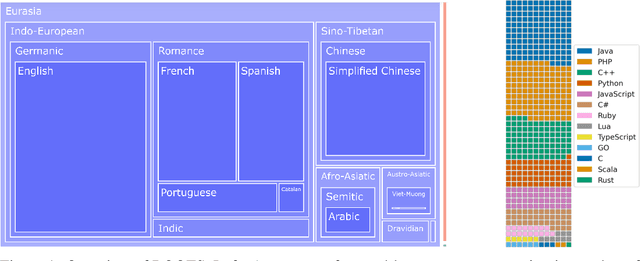



Abstract:As language models grow ever larger, the need for large-scale high-quality text datasets has never been more pressing, especially in multilingual settings. The BigScience workshop, a 1-year international and multidisciplinary initiative, was formed with the goal of researching and training large language models as a values-driven undertaking, putting issues of ethics, harm, and governance in the foreground. This paper documents the data creation and curation efforts undertaken by BigScience to assemble the Responsible Open-science Open-collaboration Text Sources (ROOTS) corpus, a 1.6TB dataset spanning 59 languages that was used to train the 176-billion-parameter BigScience Large Open-science Open-access Multilingual (BLOOM) language model. We further release a large initial subset of the corpus and analyses thereof, and hope to empower large-scale monolingual and multilingual modeling projects with both the data and the processing tools, as well as stimulate research around this large multilingual corpus.
BLOOM: A 176B-Parameter Open-Access Multilingual Language Model
Nov 09, 2022Abstract:Large language models (LLMs) have been shown to be able to perform new tasks based on a few demonstrations or natural language instructions. While these capabilities have led to widespread adoption, most LLMs are developed by resource-rich organizations and are frequently kept from the public. As a step towards democratizing this powerful technology, we present BLOOM, a 176B-parameter open-access language model designed and built thanks to a collaboration of hundreds of researchers. BLOOM is a decoder-only Transformer language model that was trained on the ROOTS corpus, a dataset comprising hundreds of sources in 46 natural and 13 programming languages (59 in total). We find that BLOOM achieves competitive performance on a wide variety of benchmarks, with stronger results after undergoing multitask prompted finetuning. To facilitate future research and applications using LLMs, we publicly release our models and code under the Responsible AI License.
Evaluate & Evaluation on the Hub: Better Best Practices for Data and Model Measurements
Oct 06, 2022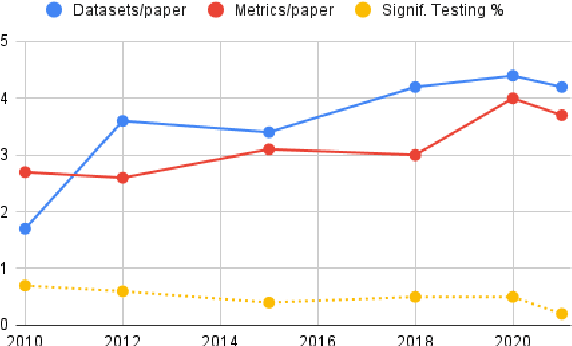
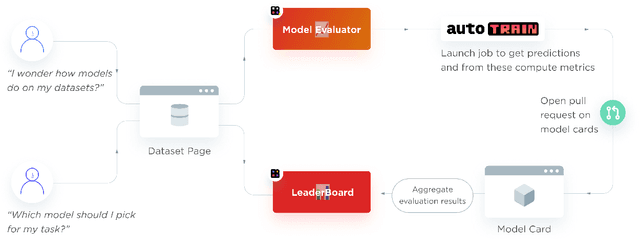
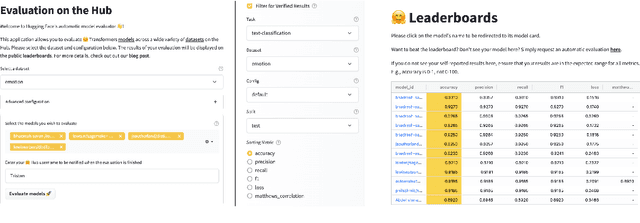
Abstract:Evaluation is a key part of machine learning (ML), yet there is a lack of support and tooling to enable its informed and systematic practice. We introduce Evaluate and Evaluation on the Hub --a set of tools to facilitate the evaluation of models and datasets in ML. Evaluate is a library to support best practices for measurements, metrics, and comparisons of data and models. Its goal is to support reproducibility of evaluation, centralize and document the evaluation process, and broaden evaluation to cover more facets of model performance. It includes over 50 efficient canonical implementations for a variety of domains and scenarios, interactive documentation, and the ability to easily share implementations and outcomes. The library is available at https://github.com/huggingface/evaluate. In addition, we introduce Evaluation on the Hub, a platform that enables the large-scale evaluation of over 75,000 models and 11,000 datasets on the Hugging Face Hub, for free, at the click of a button. Evaluation on the Hub is available at https://huggingface.co/autoevaluate.
Training Transformers Together
Jul 07, 2022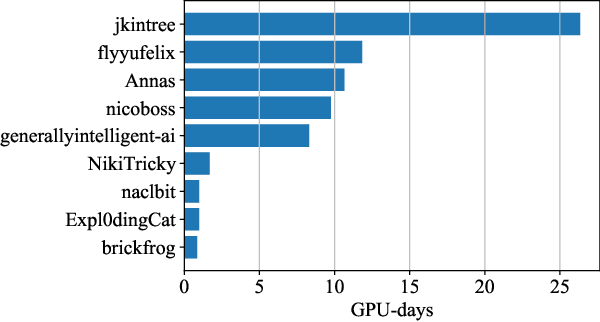
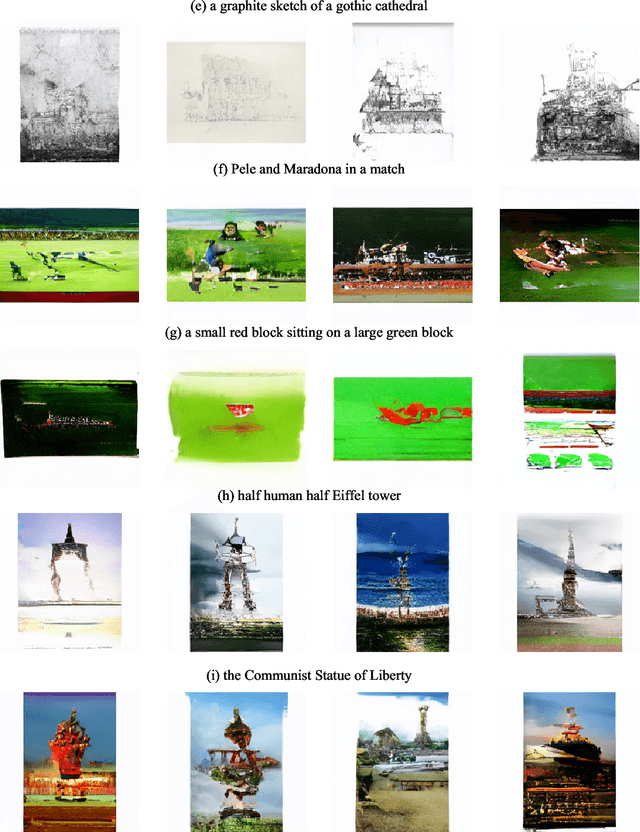
Abstract:The infrastructure necessary for training state-of-the-art models is becoming overly expensive, which makes training such models affordable only to large corporations and institutions. Recent work proposes several methods for training such models collaboratively, i.e., by pooling together hardware from many independent parties and training a shared model over the Internet. In this demonstration, we collaboratively trained a text-to-image transformer similar to OpenAI DALL-E. We invited the viewers to join the ongoing training run, showing them instructions on how to contribute using the available hardware. We explained how to address the engineering challenges associated with such a training run (slow communication, limited memory, uneven performance between devices, and security concerns) and discussed how the viewers can set up collaborative training runs themselves. Finally, we show that the resulting model generates images of reasonable quality on a number of prompts.
Datasets: A Community Library for Natural Language Processing
Sep 07, 2021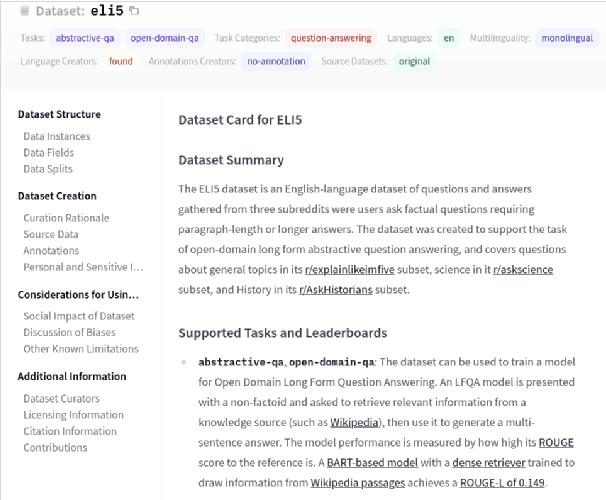
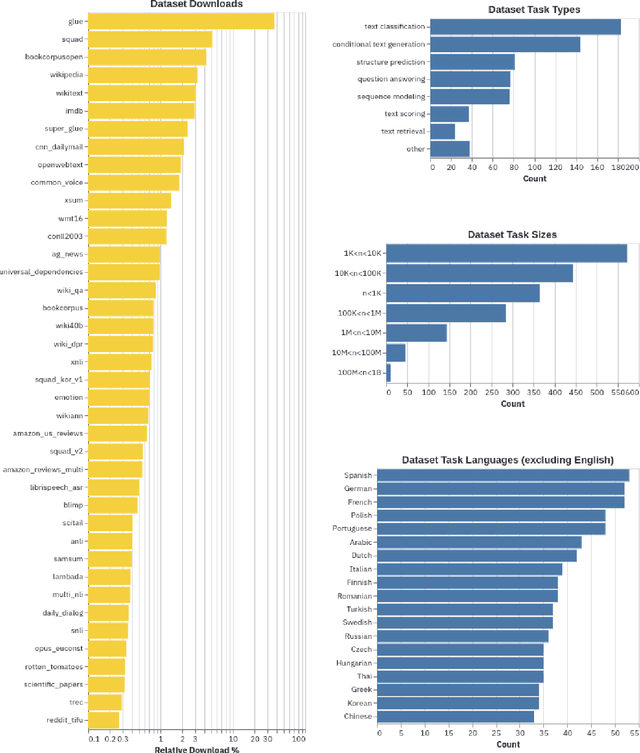
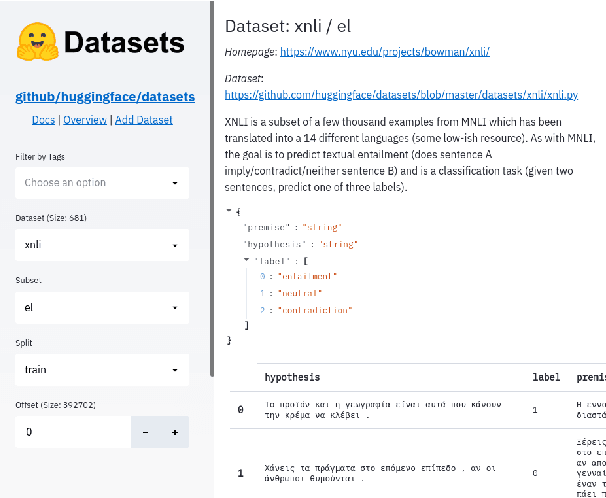
Abstract:The scale, variety, and quantity of publicly-available NLP datasets has grown rapidly as researchers propose new tasks, larger models, and novel benchmarks. Datasets is a community library for contemporary NLP designed to support this ecosystem. Datasets aims to standardize end-user interfaces, versioning, and documentation, while providing a lightweight front-end that behaves similarly for small datasets as for internet-scale corpora. The design of the library incorporates a distributed, community-driven approach to adding datasets and documenting usage. After a year of development, the library now includes more than 650 unique datasets, has more than 250 contributors, and has helped support a variety of novel cross-dataset research projects and shared tasks. The library is available at https://github.com/huggingface/datasets.
Distributed Deep Learning in Open Collaborations
Jun 18, 2021


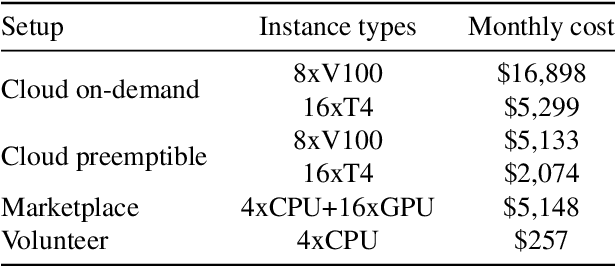
Abstract:Modern deep learning applications require increasingly more compute to train state-of-the-art models. To address this demand, large corporations and institutions use dedicated High-Performance Computing clusters, whose construction and maintenance are both environmentally costly and well beyond the budget of most organizations. As a result, some research directions become the exclusive domain of a few large industrial and even fewer academic actors. To alleviate this disparity, smaller groups may pool their computational resources and run collaborative experiments that benefit all participants. This paradigm, known as grid- or volunteer computing, has seen successful applications in numerous scientific areas. However, using this approach for machine learning is difficult due to high latency, asymmetric bandwidth, and several challenges unique to volunteer computing. In this work, we carefully analyze these constraints and propose a novel algorithmic framework designed specifically for collaborative training. We demonstrate the effectiveness of our approach for SwAV and ALBERT pretraining in realistic conditions and achieve performance comparable to traditional setups at a fraction of the cost. Finally, we provide a detailed report of successful collaborative language model pretraining with 40 participants.
 Add to Chrome
Add to Chrome Add to Firefox
Add to Firefox Add to Edge
Add to Edge